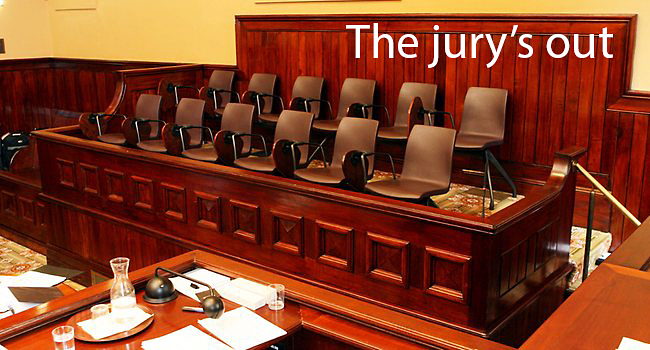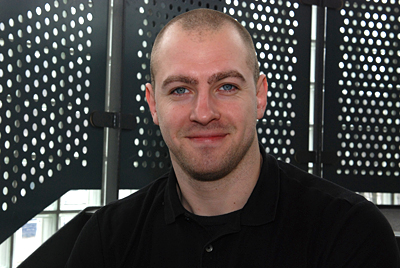Low conviction rates in rape trials – result of bias of jurors?

Thu, 09 Jun 2016 15:00:00 BST
Huddersfield PhD researcher to mount the most detailed rape trial simulations yet carried out in the UK
 A RESEARCHER at the University of Huddersfield is recreating rape trials – with the participation of professional lawyers and actors – in order to discover if low conviction rates are the result of bias among jurors. The findings could make a case for jury vetting, overturning centuries of tradition in England.
A RESEARCHER at the University of Huddersfield is recreating rape trials – with the participation of professional lawyers and actors – in order to discover if low conviction rates are the result of bias among jurors. The findings could make a case for jury vetting, overturning centuries of tradition in England.
Dominic Willmott, who is in the final phase of study for his doctorate, has already carried out short trial simulations that include a video recording of a judge’s instructions to the jury in an actual rape case. Special permission was obtained to take the cameras into court. He then recruited “jurors” from students and members of the public and they appraised the evidence and returned a verdict.
Analysis so far suggests that there is prejudice against the alleged victims of rape in cases – the great majority – where they knew their attacker.
“All of the ‘jurors’ have agreed that they focussed more on the testimony given by the victim than the defendant,” said Dominic, drawing a parallel with a burglary case in which the victim’s testimony is pulled apart by the jury.
 “When she left her window open, did she secretly want to be burgled? That is effectively what is being suggested with rape victims – the facts that they invited the man in, agreed to let them walk them home, or have a drink with them are seen as pre-requisites for agreeing to have sexual intercourse.”
“When she left her window open, did she secretly want to be burgled? That is effectively what is being suggested with rape victims – the facts that they invited the man in, agreed to let them walk them home, or have a drink with them are seen as pre-requisites for agreeing to have sexual intercourse.”
Now, as a culmination of his PhD research Dominic is to mount what he claims are the most detailed rape trial simulations yet carried out in the UK.
“Report-to-convict” ratio – five times lower than other offences
 They will be held at the University of Huddersfield in May and he is using the electoral roll to invite members of the public to take part as jury members. Professional barristers – seeing the value of the research – will participate, and trained actors will play the parts of victim and defendant. It is also possible that a serving judge will take part.
They will be held at the University of Huddersfield in May and he is using the electoral roll to invite members of the public to take part as jury members. Professional barristers – seeing the value of the research – will participate, and trained actors will play the parts of victim and defendant. It is also possible that a serving judge will take part.
The aim is to recruit 100 people to be divided into juries and on three occasions the same simulated case – based on real-life example – will be run concurrently four times. Condensation of the procedures will enable them to take place in half a day. When verdicts and are compared and jury deliberations are examined, the data will enable Dominic to conduct an analysis and make recommendations.
So far, he says, the evidence suggests that jurors – contrary to the expectations of the justice system – do not set aside pre-conceived biases when hearing a rape case. This would help explain the fact that, in a recent year, of the 15,000 alleged rapes reported to police, 3,000 proceeded to court, with guilty verdicts in just 1,000. This “report-to-convict” ratio is up to five times lower than for other offences.
Ruffling feathers
Dominic Willmott’s first degrees at the University of Huddersfield were in psychology with criminology and investigative psychology. Therefore he is using advanced psychological methodologies for his PhD, analysing personality factors that might lead to biases that influence the verdicts made by jurors. These include a psychopathic personality trait scale developed his supervisor, Dr Daniel Boduszek.
 His research so far is leading Dominic towards a recommendation that for rape cases only, there should some vetting of UK juries, to filter out those who preconceived biases might lead to them to favour either the defendant or the alleged victim. This would be a massive break with legal tradition in England.
His research so far is leading Dominic towards a recommendation that for rape cases only, there should some vetting of UK juries, to filter out those who preconceived biases might lead to them to favour either the defendant or the alleged victim. This would be a massive break with legal tradition in England.
“It will ruffle a few feathers!” he agrees.
Dominic has been presenting the findings of his research at conferences and at one of these he generated interest from the sexual offences unit at a US air base in Britain, leading to an invitation to carry our training sessions with personnel. He has also been involved with a Students’ Union campaign to educate on issues of consent.
◄ Dominic Willmott (right) is pictured with fellow Huddersfield researcher Dr Maria Ioannou (second right) on a visit to a US airbase in the UK.







